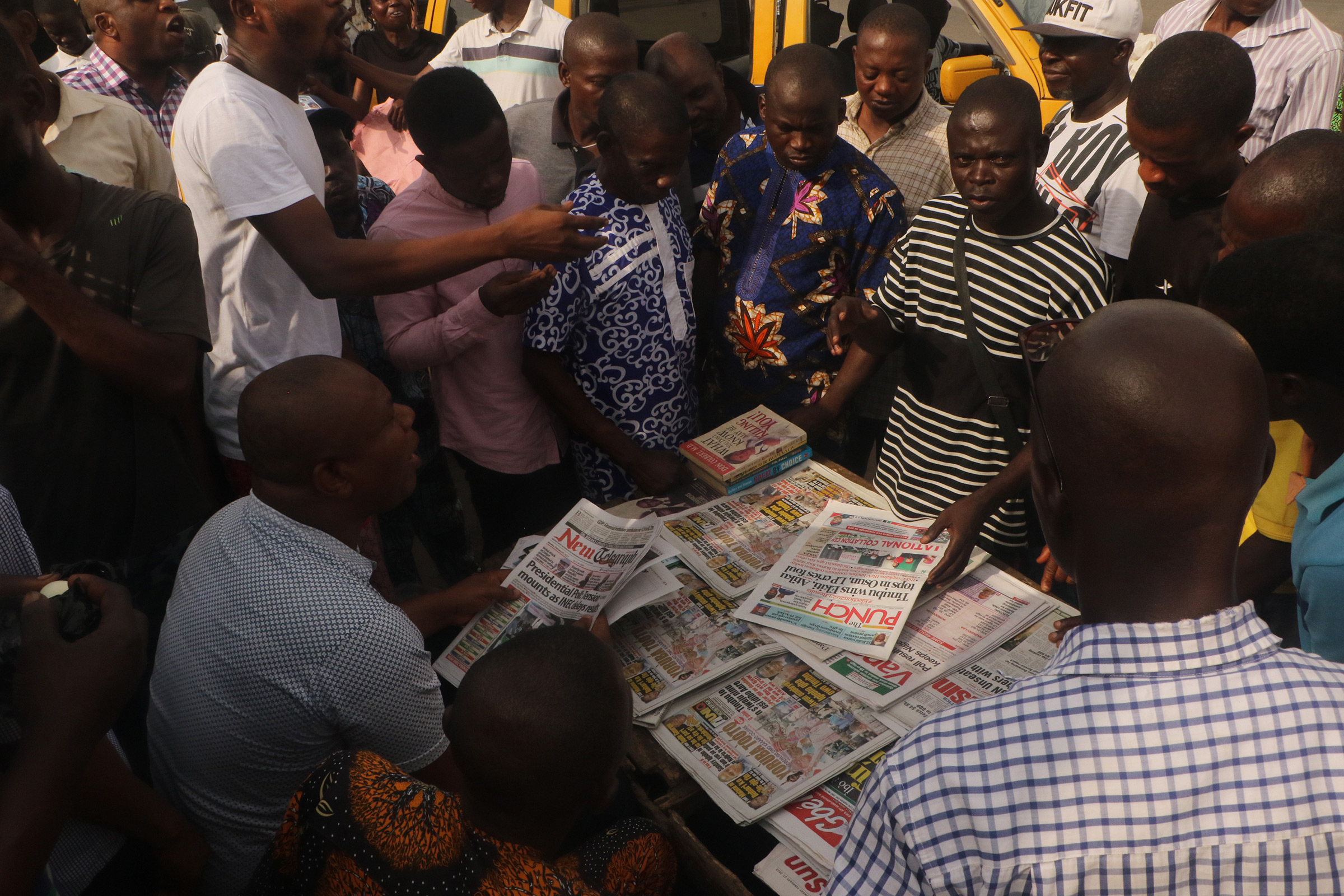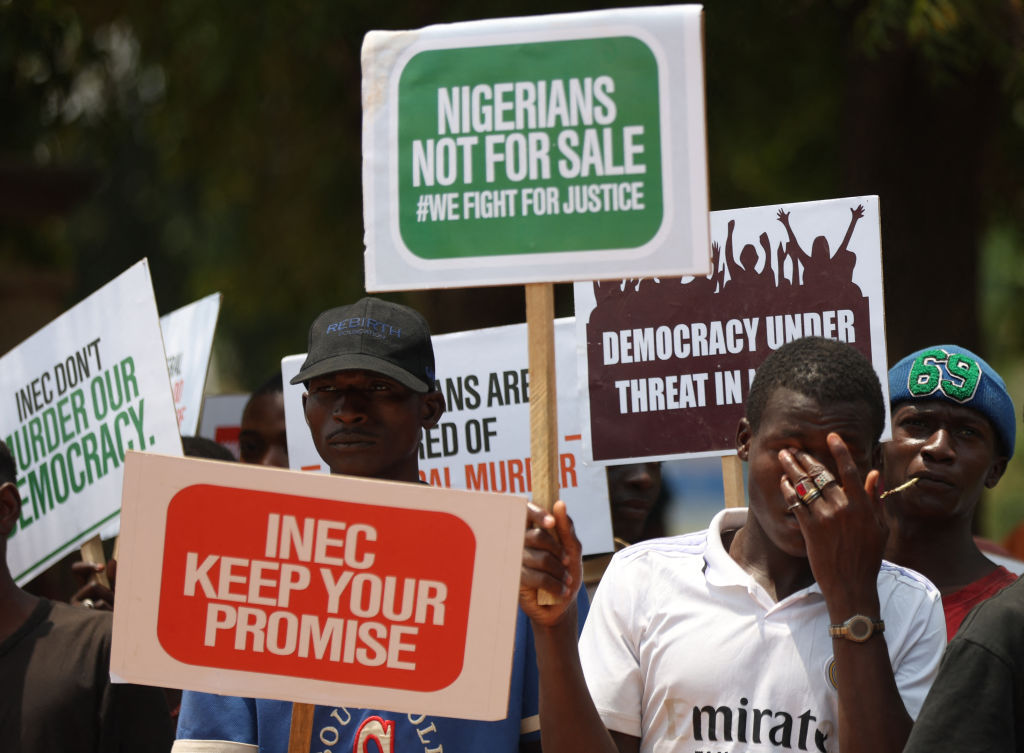
Chioma Agwuegbo was one of tens of thousands of young Nigerians who took to the streets in October 2020 to demand an end to police brutality in Nigeria. The mass movement, which became known as #EndSARS, called for the disbanding of the Special Anti-Robbery Squad after a video of a man getting killed by the police went viral. As Agwuegbo protested in the capital city of Abuja, where she heads a women’s rights non-profit called TeachHerNG, she recalls police firing live rounds and tear gas at her.
Agwuegbo says she was “heartbroken” by the government’s response to the protests, which compelled her to think about how to “take back the country” this February, as Nigeria on Saturday held the most competitive, free, and fair election since the end of military rule in 1999.
On Tuesday, Bola Tinubu from the ruling All Progressives Congress Party was declared the winner. But the ex-governor of Lagos, the country’s largest city, won with a slim margin against his opponents—Atiku Abubakar, from the main opposition People’s Democratic Party, and Peter Obi from the smaller Labour Party, a third-party candidate who many younger Nigerians had pinned their hopes on. His opponents have since expressed their discontent and are expected to challenge the results in court.
To Agwuegbo, who has monitored elections in Nigeria since 2011, Tinubu’s win is a disappointment. “The strategy and structure were theft and violence, and rotten pipes cannot produce sparkling water,” she said, referring to the Independent National Electoral Commission (INEC), the country’s electoral body.
More from TIME
Nevertheless, Tinubu, known as “Jagaban” or “leader of the warriors” by his supporters, was expected to be the frontline winner. He fought military rule in Nigeria before escaping into exile and founding the country’s democracy in 1999. In this election, he ran on the slogan, “It’s my turn”—which critics said suggested a sense of entitlement.
He will now grapple with some of the biggest challenges for Africa’s most populous country, from economic turmoil to widespread violence and corruption. In a televised acceptance speech, Tinubu called for reconciliation with his opponents. “I take this opportunity to appeal to my fellow contestants to let us team up together. It is the only nation we have. It is one country and we must build it together,” he said.
Why are Nigerians unhappy with INEC, the national electoral system?
This election was seen as Nigeria’s most technologically advanced, with INEC deploying an electronic voter accreditation system and results-viewing portal that would enhance transparency and accessibility. The high expectations over voter transparency saw millions registering to vote, and an almost 50% increase in the number of polling units since the last election in 2019.
“This electronic transmission was significant because it is intended to go a long way in reducing rigging, which often happens at the point of collation,” Mark Amaza, who works for Yiaga Africa, a civil society organization based in Abuja, said.
But the same infrastructure is now under intense scrutiny, while the credibility of INEC hangs in the balance. “Nigerians had expectations of a free and fair process, of good faith from INEC. INEC hasn’t honored that,” said Agwuegbo.

Leena Koni Hoffmann, an Africa Associate Fellow at Chatham House London, told TIME that the technology failed to transmit results from the polling units, which was “a critical part of preventing the manipulation of the results and credibility of the outcome.”
E.U. observers said that poor planning and communication from INEC undermined trust in Nigeria’s democratic process, while Afrobarometer found that 78% of Nigerians said they had little or no trust in INEC. In neighboring countries like Ghana and Kenya, the technology has also raised concerns about election fraud from hacking and manipulation.
As a result of the scrutiny, both Abubakar and Obi have dismissed the election results and demanded a rerun. In his victory speech, Tinubu said that his rivals could rightfully challenge the results in court, but that the lapses in the election “were relatively few in number and were immaterial to affect the outcome of this election.”
To Amaka Anku, Africa director at the Eurasia Group consultancy, the scrutiny suggests one thing: “In my view, the electoral commission over-promised and raised expectations, and now, people feel disappointed and it’s being used by the opposition to argue that the results are not valid.”
What’s next for Tinubu as he leads Nigeria?
With nearly 216 million people, Nigeria is a top oil producer with the biggest population and the largest economy in Africa. In the next 25 years, it is expected to surpass the U.S. as the third-most-populous country. But many Nigerians, young and old, are hoping that the next president will successfully grapple with the immense challenges facing the country, which include a severe cash crisis after a botched effort to replace all banknotes, high inflation and corruption, and deadly attacks by armed men against civilians amid a backdrop of chaos and widespread unrest.
A recent survey by Afrobarometer, a pan-African polling organization, found that 89% of Nigerians thought their country was heading in the wrong direction. Amaza said that the overall dissatisfaction with governance has contributed to the feeling that “if we don’t get it right now, we may never get it right again.”
In Lagos state, home to Africa’s biggest city and previously a main stronghold for Tinubu, Obi won by a fraction (582,454 votes over Tinubu’s 472,606 votes), reflecting how young and urban voters are fed up with traditional politics. Of the 87 million eligible voters in the country, nearly 40% of those who registered to vote were under the age of 34, demonstrating an unprecedented level of young voter turnout as well as support for Obi.
For Anka, this fracture suggests a “delicate and tense moment” for Nigeria. Alongside challenging the results in court, she said Nigeria would likely see protests in the coming days from dissatisfied Nigerians in cities like Lagos and Abuja.
“The president-elect will face a very significant challenge of successfully articulating a positive vision for the country that can bring people together,” she said.
More Must-Reads from TIME
- Cybersecurity Experts Are Sounding the Alarm on DOGE
- Meet the 2025 Women of the Year
- The Harsh Truth About Disability Inclusion
- Why Do More Young Adults Have Cancer?
- Colman Domingo Leads With Radical Love
- How to Get Better at Doing Things Alone
- Michelle Zauner Stares Down the Darkness
Write to Astha Rajvanshi at astha.rajvanshi@time.com